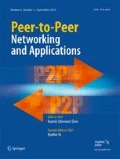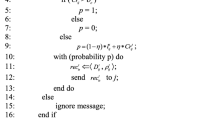Abstract
Most existing feedback or recommendation-based peer-to-peer trust models are implemented based on credible and sufficient feedbacks. However, there exist too many malicious nodes which provide false feedbacks, and what is more they do not even provide feedbacks. Also, since indirect trust is usually used to calculate a node’s trust in most feedback-based trust models, the high communication complexity is required for getting feedbacks in the network. Aiming at solving these problems, this paper presents an implicit feedback mechanism in peer-to-peer trust models. Any node owns its proxy nodes, and the node’s trust and feedbacks are both calculated by its chief proxy node implicitly and automatically without human intervention, thus reducing the impact of false or insufficient feedbacks on the trust calculations. Meanwhile, all the feedbacks and evaluations on a node are managed by the node’s proxy nodes implicitly, rather by itself, reducing both the possibility that they are falsified by the malicious nodes and the communication complexity. The simulation results show that our implicit feedback mechanism could both improve the performance of peer-to-peer trust models and reduce the communication complexity.






Similar content being viewed by others
References
Resnick P, Zeckhauser R. Trust among strangers in internet transactions: empirical analysis of eBay’s reputation system. The Economics of the Internet and Ecommerce. Advances in Applied Microeconomics, 2002, vol.11.
Xiong L, Liu L (2004) PeerTrust: supporting reputation-based trust in peer-to-peer communities. IEEE Transactions on Data and Knowledge Engineering, Special Issue on Peer-to-Peer Based Data Management 16(7):843–857
Jianli Hu, Quanyuan Wu, Bin Zhou. RBTrust: A Recommendation Belief Based Distributed Trust Management Model for P2P Networks. In 10th IEEE International Conference on High Performance Computing and Communications, pp. 950–957, 2008,
Azzedin F, Ridha A (2009) Feedback behavior and its role in trust assessment for peer-to-peer systems. Telecommun Syst. doi:10.1007/s11235-009-9263-9
FANG Qun, JI Yi, WU Guo-Xin, ZHAO Sheng-Hui, WU Peng. Run length coding-based dynamic trust model for P2P network. Journal of Software, 2009, 20(6): 1602–s1616.
Huang Z, Lu S, Zhang A, et al. (2012) Impact of feedback on trust in P2P networks. Journal of Networks 7(8):1182–1188
Can AB, Bhargava B (2013) SORT: a self-organizing trust model for peer-to-peer systems. IEEE transactions on dependable and secure computing 10(1):14–27
Kleinberg J. The small-world phenomenon: An algorithmic perspective. Proceedings of the thirty-second annual ACM symposium on Theory of computing. ACM, 2000: 163–170.
Amazon [EB/OL]. http://www.amazon.com/.
Sepandar DK, Mario TS, Hector GM. The EigenTrust algorithm for reputation management in P2P networks. In: Proc. of the 12th Int’l Conf. on World Wide Web. Budapest: ACM Press, 2003. 640–651.
Wen D, Huaimin W, Yan J, Peng Z (2004) A recommendation based peer-to-peer trust model. Journal of Software 15(4):571–583
Fan X, Li M, Ma J, et al. (2012) Behavior-based reputation management in P2P file-sharing networks. J Comput Syst Sci 78(6):1737–1750
Li X, Zhou F, Yang X (2011) A multi-dimensional trust evaluation model for large-scale P2P computing. Journal of Parallel and Distributed Computing 71(6):837–847
Jia C, Xie L, Gan XC, et al. (2012) A trust and reputation model considering overall peer consulting distribution. IEEE transactions on systems man and CYBERNETICS part a-systems and humans 42(1):164–177
Zhao HY, Li XL (2013) VectorTrust: trust vector aggregation scheme for trust management in peer-to-peer networks. J Supercomput 64(3):805–829
Ren YZ, Li MC, Sakurai K, FineTrust: a fine-grained trust model for peer-to-peer networks (2011) Security and Communication etworks 4:61–69
X. G. Dong, Y. Li. Feedback-based multidimensional trust model in P2P networks. Computer Applications and Software, vol. 28, Jul. 2011.
Meng X, Ding Y, Gong Y (2012) @ trust: a trust model based on feedback-arbitration in structured P2P network. Comput Commun 35(16):2044–2053
Yu J, Zhimin G, Zhijie B (2008) A new reputation management mechanism based on Bi-ratings in peer-to-peer systems. Journal of Computer Research and Development 45(6):942–950
Li X, Zhou F, Yang X (2012) Scalable feedback aggregating (SFA) overlay for large-scale P2P trust management. IEEE Transactions on Parallel and Distributed Systems 23(10):1944–1957
PeerSim[EB/OL]. http://peersim.sourceforge.net/.
Author information
Authors and Affiliations
Corresponding author
Rights and permissions
About this article
Cite this article
Meng, X., Meng, H. & Li, T. Research on the implicit feedback mechanism in peer-to-peer trust models. Peer-to-Peer Netw. Appl. 10, 1257–1269 (2017). https://doi.org/10.1007/s12083-016-0478-8
Received:
Accepted:
Published:
Issue Date:
DOI: https://doi.org/10.1007/s12083-016-0478-8




